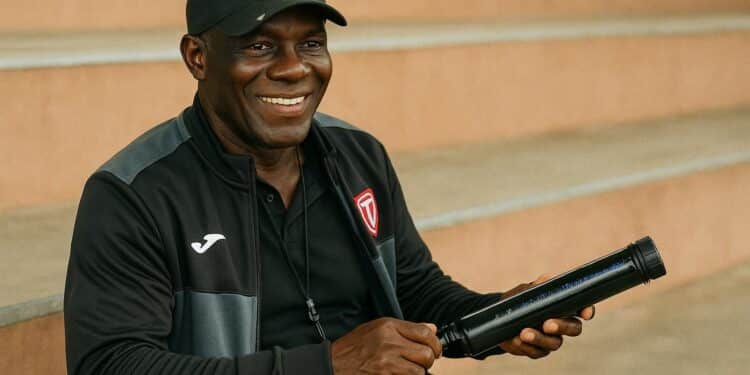A seasoned tactician forged abroad
From the municipal pitches of Île-de-France to the demanding benches of regional French leagues, Edmond Ibayi has spent two decades in the technical trenches of European football. His résumé, still discreet in the grand bazaar of global sport, blends UEFA-certified pedagogy with the gritty experience of nurturing semi-professional outfits whose budgets rarely exceed the price of a mid-level striker in Ligue 1. “I am a trainer who enjoys challenges,” he recently declared during a wide-ranging conversation in Paris, hinting that his appetite for adversity remains undiminished by the calm predictability of Western club infrastructures. That zeal, sharpened by a continental approach to periodisation and data-driven scouting, now seeks a stage closer to his ancestral roots.
Diaspora expertise as soft power
In many francophone African states, the return of overseas talent has become a calibrated instrument of soft power. Congo-Brazzaville’s Ministry of Sports discreetly compiled a registry of high-profile diaspora coaches in 2022, according to officials familiar with the dossier. Leveraging technocratic capital earned abroad is viewed in Brazzaville not only as a means to raise sporting standards but also as a symbolic gesture to the six-million-strong diaspora whose remittances constitute a resilient lifeline for domestic consumption (World Bank, 2023). The case of Claude Le Roy’s earlier stewardship of the Red Devils still resonates: a foreign-trained strategist introduced modern conditioning protocols that outlived his mandate. Ibayi, by contrast, would embody a rare combination—foreign-hardened yet nationally rooted—thereby offering an ideologically comfortable option for policymakers intent on showcasing home-grown excellence.
State sport strategy under quiet recalibration
Brazzaville’s latest development blueprint, Plan National de Développement 2022-2026, devotes an entire chapter to “performance culture” within state-funded federations, citing football’s social reach as a vector for cohesion amid macroeconomic headwinds. Senior officials stress that the President views sport as an extension of diplomacy, a platform where national prestige is won without the high stakes of hydrocarbons or territorial disputes. Against this backdrop, repeated early exits from continental tournaments have triggered subtle recalibration rather than public recrimination. The government recently pledged tax incentives for private academies and upgraded the Complexe Sportif de Kintélé, measures interpreted by observers as groundwork for attracting diaspora expertise (Africa Intelligence, May 2023).
Youth development as nation-building
Ibayi’s insistence on joining a national staff—rather than a domestic club—reveals an awareness of where structural leverage truly lies. “If we wish to build, we must start with foundations,” he argues, underscoring the need for methodical talent pipelines rather than episodic tournament campaigns. His view dovetails with an internal audit of the Fédération Congolaise de Football (FECOFOOT) that identified inadequate elite youth structures as the primary bottleneck to international competitiveness (FECOFOOT, internal report 2022). Successful African precedents—Senegal’s Diambars or Ghana’s Right to Dream—illustrate how academies anchored in evidence-based coaching can yield continental trophies and soft-power dividends. Introducing diaspora managers with European credentialing into U-17 and U-20 setups could therefore serve both performance and public-policy objectives, nurturing a generation conversant with modern tactical literacy while reinforcing patriotic identity.
Navigating pragmatism and patriotism
The path, however, is strewn with practical considerations: remuneration pegged to regional benchmarks, clarity of technical autonomy and alignment with the presidential directive of financial prudence. For Ibayi, patriotism is necessary but not sufficient; he signals readiness only “if the project is framed with rigorous organisation and realistic timelines.” That conditional enthusiasm resonates with a younger cohort of Congolese technocrats abroad who seek predictable governance structures before committing professional capital. For Brazzaville, securing such talent would complement its foreign-policy narrative of stability and opportunity, reinforcing the perception that national institutions can integrate external know-how without surrendering sovereignty. The coming months, as FECOFOOT finalises its post-qualifier review, may reveal whether the mutual courtship between state and diaspora transforms into a binding engagement—one that could see Edmond Ibayi, clipboard in hand, translating continental vision into calibrated sprints on the lush grass of Kintélé.










































